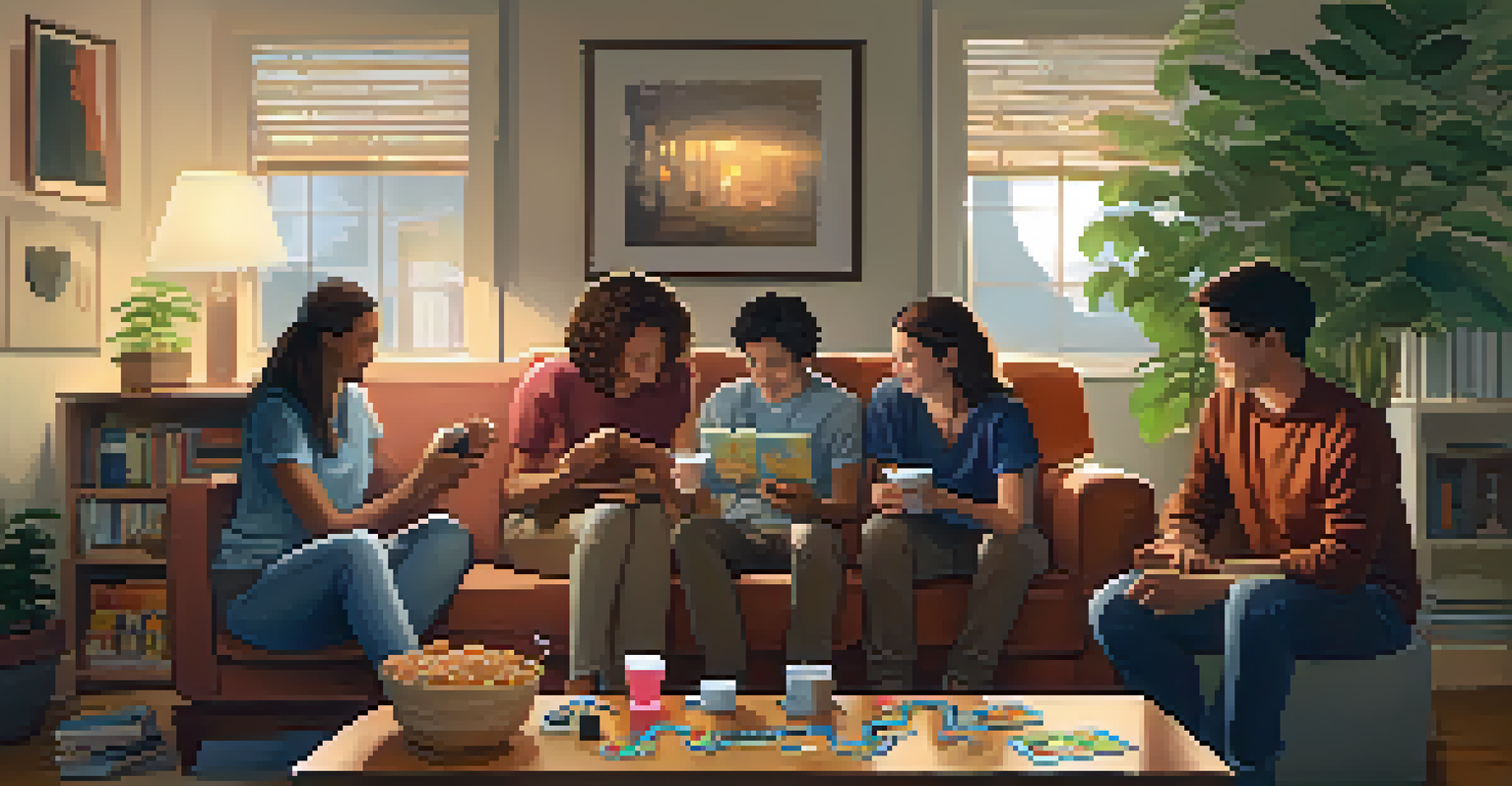Social Media's Effect on Mental Health During Adolescence

The Double-Edged Sword of Social Media
Social media can feel like a magical playground for adolescents, offering a space to connect, share, and express themselves. However, this virtual world also carries shadows that can impact mental health. While it can foster friendships and support, it can also lead to feelings of isolation and anxiety when interactions go awry.
Social media is both a blessing and a curse, offering connection while posing risks to mental health.
For instance, a teen might feel elated when receiving likes on a post but equally devastated by a negative comment or a lack of engagement. This inconsistency can create a rollercoaster of emotions, making it challenging for young minds to navigate their feelings. It's essential to recognize that not all social media experiences are positive, and the negative ones can be particularly impactful.
In essence, while social media provides a platform for connection, it can simultaneously contribute to mental health challenges. Understanding this dual nature is crucial for both teens and their guardians as they navigate the complexities of online interactions.
The Rise of Cyberbullying Among Teens
Cyberbullying has become a prevalent issue in the social media realm, affecting countless adolescents. Unlike traditional bullying, the online variety can happen 24/7, creating a relentless environment of fear and anxiety. This constant exposure can lead to severe emotional repercussions, including depression and low self-esteem.

Imagine a teen receiving hurtful messages on Instagram or being excluded from a group chat. These experiences can feel magnified in the digital space, where the audience is vast, and the anonymity can embolden bullies. The emotional toll of such encounters can be profound, leading to feelings of helplessness and isolation.
Addressing cyberbullying requires awareness and proactive measures from parents, educators, and peers. By fostering open conversations about online behavior and encouraging empathy, we can help mitigate the harmful effects of cyberbullying and create a safer online environment for adolescents.
Social Comparison: A Recipe for Anxiety
Social media platforms are often a highlight reel of people's lives, showcasing only the best moments. For adolescents, this can create a skewed perspective where they constantly compare themselves to others, leading to feelings of inadequacy. The pressure to measure up to seemingly perfect lives can be overwhelming.
The greatest danger of social media is that it gives everyone a voice, but not everyone has something valuable to say.
Consider a teenager scrolling through their feed, seeing friends at glamorous parties or achieving academic success. They may start to question their worth and feel that they are falling behind. This comparison can foster anxiety and a distorted self-image, making it challenging to appreciate their unique journey.
To counteract these feelings, it's important for teens to understand that social media often presents an unrealistic portrayal of life. Encouraging them to focus on their strengths and cultivate a positive self-image can help mitigate the impact of social comparison.
The Role of FOMO in Adolescent Mental Health
The fear of missing out, commonly known as FOMO, is a pervasive phenomenon among teens today. Social media amplifies this feeling by constantly showcasing events and gatherings that they might not be included in. This can lead to heightened anxiety, loneliness, and a sense of exclusion.
For example, a teen might see their friends hanging out without them and feel an immediate pang of sadness or frustration. This feeling can be exacerbated by not wanting to miss out on experiences that seem to define social status among peers. FOMO can create a cycle of anxiety that impacts mental well-being.
To combat FOMO, it's essential to foster a supportive environment where teens can express their feelings. Encouraging them to engage in activities that bring joy and fulfillment can help shift their focus away from what they might be missing and towards what they truly enjoy.
The Positive Aspects of Social Media for Teens
While there are many challenges associated with social media, it's important to highlight its positive aspects as well. For many adolescents, social media serves as a platform for self-expression and creativity. It can be a place where they share their passions, talents, and ideas, fostering a sense of identity and belonging.
For instance, a teen passionate about art might showcase their work on platforms like Instagram or TikTok, receiving encouragement and feedback from peers. These positive interactions can build confidence and provide a sense of community, which is vital for mental health. Moreover, social media can help teens connect with others who share similar interests or experiences, creating supportive networks.
Recognizing the positive potential of social media allows us to encourage healthier online habits. By promoting constructive engagement and celebrating individuality, we can help adolescents harness the benefits of social media while minimizing its drawbacks.
Setting Healthy Boundaries with Social Media
Establishing healthy boundaries around social media usage is crucial for maintaining mental well-being. For adolescents, this means understanding when to unplug and engage in offline activities. Parents and guardians can play a pivotal role in guiding teens to balance their online and offline lives.
For example, creating tech-free zones during family meals or designating specific times for social media use can encourage healthier habits. These boundaries can help teens recognize the importance of face-to-face interactions and self-reflection, which are vital for emotional resilience.
Encouraging open discussions about social media experiences can also empower teens to make informed choices. By fostering an environment where they feel comfortable sharing their feelings, we can help them establish a healthier relationship with social media.
The Importance of Open Conversations About Mental Health
Creating a safe space for discussing mental health is essential for adolescents navigating the challenges of social media. Open conversations can help destigmatize mental health issues and encourage teens to seek support when needed. This dialogue can also empower them to recognize their feelings and understand that they are not alone.
For instance, parents can initiate discussions by sharing their own experiences with mental health struggles, creating an atmosphere of trust and understanding. By normalizing these conversations, teens may feel more comfortable expressing their emotions and seeking help from trusted adults or friends.

Ultimately, fostering a culture of openness around mental health can lead to healthier coping mechanisms. It encourages adolescents to prioritize their well-being and seek support rather than suffering in silence.
Conclusion: Navigating Social Media for Better Mental Health
Navigating the complex landscape of social media is a multi-faceted journey for adolescents. By understanding its effects on mental health, both positive and negative, we can better equip teens to handle their online experiences. It's crucial to acknowledge the challenges while also celebrating the opportunities for connection and self-expression.
Encouraging healthy boundaries, open conversations, and awareness of social media's impact can create a more supportive environment for teens. With the right guidance, they can learn to navigate social media in a way that enhances their mental well-being rather than detracts from it.
Ultimately, the goal is to empower adolescents to use social media as a tool for connection and growth, ensuring that their online experiences contribute to a positive mental health journey.